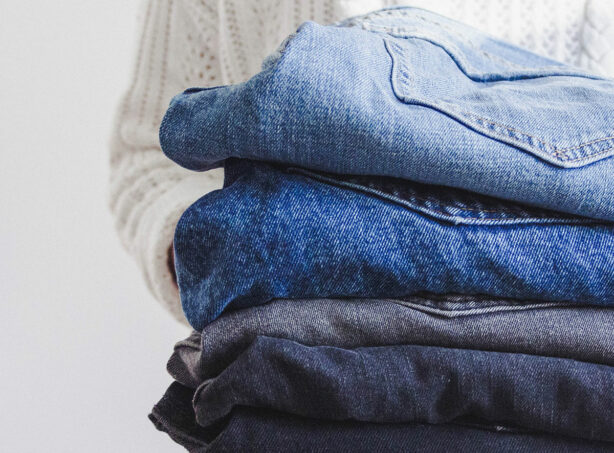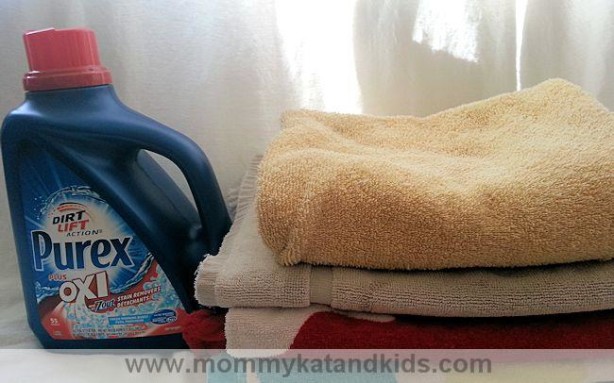Have you ever taken a load of freshly-laundered clothes out of the machine, only to find that they still smell bad?
Sometimes, clothing can still hold onto odors even after washing. And tossing the laundry back in the machine right away may not be the best solution.

Instead, you need to identify what’s causing the stench. Once you’ve figured out why your clothes smell, you’ll be able to find an effective remedy for removing the lingering odors.
If you’re currently dealing with stinky clothes, read on to find out about the most common odors, why they stick to fabric, and how to remove smells from clothes permanently:
Sweat
Sweat by itself doesn’t smell bad, but when it reacts to bacteria on your body and clothes, the combination causes the stench you’ve come to know and hate.
In particular, sweat from the armpits and groin area tends to be particularly odorous, because it’s produced by apocrine glands and contains fats and proteins that break down to produce body odor.
And if you’re wearing clothing made of synthetic fibers, these fabrics allow for bacteria to proliferate, making your garments stink even more.
To get rid of the odor, soak clothing in a solution of warm water and vinegar with a ratio of 4:1 before laundering.
You can also soak your garments in warm water with a half cup of baking soda. Leave them for 30 minutes or so, and then wash as you usually would.
And, to prevent issues in the first place, you may want to buy antimicrobial tights and leggings and other antimicrobial garments if you exercise regularly or are prone to excessive sweating.
The antimicrobial technology of these garments prevents bacteria from building up on the fabric, so they are less likely to develop foul odors.
Residual Smoke
Smoke easily clings to the fabric of your clothes. Even if you’re just passing through a group of smokers, the smell of smoke can quickly attach to your clothes, leaving the scent lingering on you and your ensemble.
To help get rid of this odor, air out your clothes immediately in a well-ventilated area or outdoors in the fresh air.
Afterward, throw them into the washer and add a half cup of freshly-squeezed lemon juice during the first cycle. The lemon juice helps eliminate the odor of smoke.
As with sweat odors, you can also soak your clothes in a warm water and vinegar mixture. Leave your garments to soak for an hour before putting them into your washer.

Mildew or Mold
Mildew is a mold or fungus that will occasionally form in the warm and wet environment of your washer.
If your washer has mildew or mold, the growth can transfer to your clothes and give them a sour smell, especially if you forget the clothing in the washer overnight.
Moldy apparel can also cause those with respiratory issues to cough, wheeze, or have itchy eyes. For this reason, removing the mildew from your garments is necessary for preserving the health of yourself and those around you.
Bleach is the most effective way to kill mildew and mold. Use bleach on white clothing and to clean the washer to help prevent mildew from forming.
For clothes that can’t be bleached, including colored garments or white t-shirts with spandex, add one cup of white vinegar or baking soda during an additional rinse cycle. Afterward, dry your clothes under the sun to further eliminate the sour odor.
If the mildew is especially bad or has stained the clothing, however, you may be better off throwing the items away.
Perfume
Perfume may be pleasant-smelling at first, but it can leave an oily stain that causes a more unpleasant odor. Chemicals in your perfume may be incompatible with the chemicals in the detergent that you use, causing a strange smell when combined.
Additionally, washing your clothes with fragrance-packed detergents can cause their fragrances to build up in fabric along with the chemicals in perfumes.
This fragrance build-up can permeate your garments, causing them to have a perfume scent that’s unpleasantly strong. Heavy scents may even trigger a migraine or asthma attack.
To remove perfume aroma from your clothes, wash them with a scent-free detergent and washing soda. After the wash, hang the garments to dry, preferably outdoors in the sun.
Gasoline
You may accidentally end up with gasoline on your clothing when filling up your gas tank or making repairs to your vehicle.
The scent of gasoline can be overwhelming, and you’ll want to eliminate any gasoline stains from clothes before washing or drying them. Gasoline-stained clothing can even be a fire hazard.
Remove gasoline from the fabric by blotting the excess with a paper towel or rag. You can also put baking soda on the stain and wait five minutes for the powder to absorb as much of the gas as possible.
Afterword, soak the clothes in vinegar and warm water with a ratio of 1:1. Soak until the stain and stench are gone, and then toss the garment in the washer by itself, adding a small amount of dish soap to the regular detergent.
Hang the clothing to dry outdoors to avoid the risk of a fire, and repeat the process if needed.

It’s important to remember that stinky clothes aren’t just stinky. Scents caused by fungus or chemicals can also affect our health and make us feel sick while wearing them.
But when you know what’s causing the odor, knowing how to remove smells from clothes becomes much easier. And that means cleaner, fresher clothing every single time you do the laundry.
